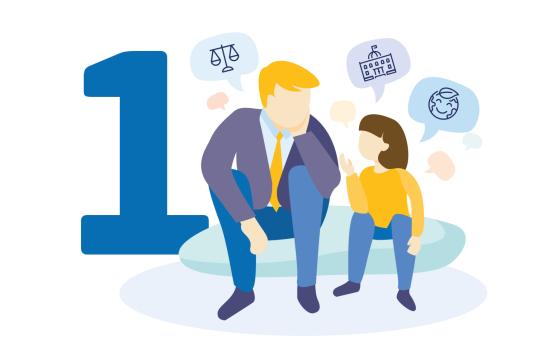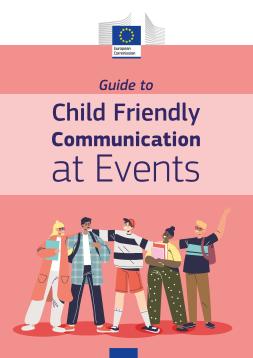The right to be heard
Article 24 of the Charter of Fundamental Rights of the European Union states that: "Children(…) may express their views freely. Such views shall be taken into consideration on matters which concern them in accordance with their age and maturity."
The right of all children to be heard and have their views taken seriously in accordance with their age and maturity is also laid down in Article 12 of the UN Convention on the rights of the child (UNCRC).
Children have the right to express their views and opinions. The Commission took children’s views into account in the EU strategy on the rights of the child and committed to promote and protect children’s right to be heard.
EU actions to empower children to be active citizens and members of democratic societies
The establishment of the EU Children’s Participation Platform marks the key deliverable of the European Commission commitments on child participation as enshrined in the Strategy. It reflects the Commission's dedication to child participation as a cross-cutting priority and its effort to incorporate the perspectives of its youngest citizens into its legislative and policy frameworks.
The Commission set up the Platform in 2022 together with civil society organisations, the European Parliament, international organisations, and children themselves. It connects existing child participation mechanisms at local, national and EU level.
The Platform is already functioning at full speed. The Platform has recently gathered the views of over 1,000 children on what they need to feel safe. These invaluable insights informed the Commission Recommendation on Integrated Child Protection Systems, thereby demonstrating the direct impact of child participation on EU policy-making.
Under the EU Strategy on the rights of the child, the Commission additionally committed to:
- create space for children to become active participants of the European Climate Pact through pledges or by becoming Pact Ambassadors. By involving schools in sustainable climate, energy and environment education, the Education for Climate Coalition will help children to become agents of change in the implementation of the Climate Pact and the European Green Deal.
- The Commission launched a call for Pact Ambassadors to inform, inspire and support climate policy and action in their communities and networks. Additionally, the Education for Climate Coalition has been set up to inspire, develop and draw on innovative European education capabilities. - develop and promote accessible, digitally inclusive and child friendly versions and formats of the Charter of Fundamental Rights and other key EU instruments
- a child friendly version for the Strategy on the rights of the child was created, as well as on Better Internet for Kids+ and for the Directive on procedural safeguards for children accused or suspects of crime (page 9); - develop and promote guidelines on the use of child friendly language in documents and in stakeholders’ events and meetings with child participants
- The following documents have been created:
• Guide on creating child-friendly versions of written documents
• Guide to child friendly communication at events
• Consent forms for children and parents/guardians/carers
• Writing documents with and for children - images and icons
The guides illustrate the process, the methodology of consulting children on policy and legal documents and give practical examples of commonly used simpler words (glossary), with icons and Alt- text that are ready to be used. It contains an editable template of a consent form for children and their parents/carers.
- include children within the Fundamental Rights Forum of the EU Agency for Fundamental Rights (FRA) and the Conference on the future of Europe
- Young people (from 16 years old) are involved in the preparation of the Fundamental Rights Forum through the Fundamental Rights Dialogues and the Forum itself; The Conference on the Future of Europe, and the multi-lingual platform linked to it, gathered many opinions and recommendations from citizens’ debates and other consultations. - conduct child-specific consultations for relevant future initiatives:
- children were consulted on the Recommendation on integrated child protection system (May - September 2023). - strengthen expertise and practice on child participation among Commission staff and the staff of EU agencies, including on child protection policies and safeguarding policies
- a series of training events, including on the guidelines and on child participation more generally were organised yearly from the end of 2021.
Study on child participation
Studies commissioned by the European Commission on child participation in EU political and democratic life.
In 2020, the European Commission commissioned a study on child participation in EU political and democratic life. The report covers 27 Member States and the UK, looking the child participation at the national level. For 10 countries, the researchers looked also at the local level. The report shows as well 12 case studies. More than 200 children and young people shared their opinions and experiences in interviews and focus groups that were organised.
Report on child participation in EU political and democratic life
Accessible version of the report on child participation in EU political and democratic life
Children’s participation structures and mechanisms
In 2015, the European Commission carried out a study to map legislation, policy and practice on child participation in all 28 EU Member States.
Evaluation of legislation, policy and practice of child participation in the EU. Resource catalogue
Evaluation of legislation, policy and practice of child participation in the EU. Final report




